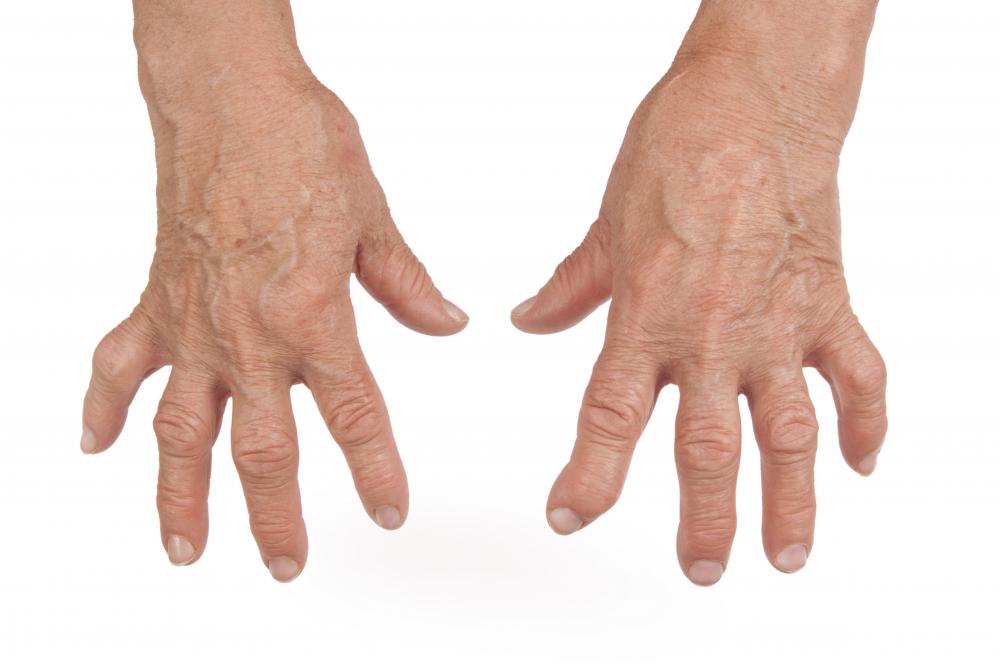At TheHealthBoard, we're committed to delivering accurate, trustworthy information. Our expert-authored content is rigorously fact-checked and sourced from credible authorities. Discover how we uphold the highest standards in providing you with reliable knowledge.
What are the Best Arthritis Drugs?
Arthritis comes in many forms, and can afflict people of various ages. The varieties of arthritis, although numerous, are generally described as being either rheumatoid arthritis or osteoarthritis. Whatever the variety, the relief of pain and inflammation is an important part of treatment. The best arthritis drugs will be whichever ones have the most positive effect on the patient. Because individual responses to drugs vary, and because of the potential for side effects, finding the best arthritis drugs can be a difficult process.
Osteoarthritis is the more common type of arthritis, and results from the overuse of joints, or from too much weight being carried by them. Sports injuries and simple aging can bring on osteoarthritis, as well as being overweight for long periods of time. As the cartilage between bones breaks down, stiffness and pain occur when the joint is moved. The main goal of osteoarthritis treatment is pain relief, which can be accomplished by arthritis drugs from any of a number of categories.

Analgesics are simple pain relievers such as acetaminophen, and these are very common for use as arthritis drugs. Nonsteroidal anti-inflammatory drugs (NSAIDs) are also common in the treatment of arthritis, and include naproxen and ibuprofen. COX-2 inhibitors are a class of NSAIDs, but are less commonly used.
Rheumatoid arthritis (RA) is different from osteoarthritis in that it is an autoimmune disease, rather than just a wearing out of the joints. However, it is also possible to suffer from both types of arthritis concurrently. For reasons which remain unclear to doctors, the joints are almost the only area affected by RA. This malfunctioning of the immune system can cause greater damage to the joints than osteoarthritis, as well as other symptoms than pain, such as fevers, loss of appetite, and fatigue.

Persistently swollen joints are also common with RA, and often occur in symmetrical patterns. In other words, if one hand is affected, the other one will be as well. RA can also adversely affect the heart and lungs, and cause skin rashes. Because of the difference in symptoms and causes between osteoarthritis and RA, different arthritis drugs are employed in the treatment of RA. For instance, disease-modifying antirheumatic drugs (DMARDs) are specially adapted to be able to treat RA by changing the course of the inflammation, and sometimes stopping its progression.

For best results, DMARDs must be used early on and aggressively, since they can take months to work. Corticosteroids, often simply called steroids, can quickly reduce swelling and inflammation in the joints and elsewhere. However, they are very potent and can cause serious side effects if used for too long or at too high a dosage. Consulting with a medical professional is the best way for individuals to determine which arthritis drugs are best for their situations.
AS FEATURED ON:
AS FEATURED ON:














Discussion Comments
I have terrible arthritis in my feet that started about 6 months ago. I can’t stand for very long and sometimes the pain is so bad I can’t even walk. It’s especially painful when I step out of bed in the morning.
I’ve tried several over the counter medications and I’m currently taking a prescribed pain reliever. It helps some with the pain, but what has worked the best for my arthritis is a home remedy of Epsom salt. Just once a day, soaking my feet in warm water with a few tablespoons of the salt has done wonders for me.
@aviva - Swimming has been an excellent treatment for my arthritis. I love to swim so this hasn’t been a problem for me. It really does loosen the joints from arthritis stiffness. As far as exercises go, I’ve found that the walking movements work the best.
They’re really very easy and you can do them at your own pace. Take a few steps forward, backward and even side by side. Pulling your knees up to your chest works well too, as does squatting.
I think you can do all of these exercises out of the water too, but the weightlessness from the water is more relaxing. I usually take a little ibuprofen before I swim to prevent any pain from flaring up later on.
I am 59 years old and have been diagnosed with osteoarthritis of the hip and knees. My arthritis symptoms are not that severe so my doctor suggested I start an exercise routine to help prevent it from getting any worse.
I am wondering what exercises are the best for reducing arthritis pain and swelling. Are swimming and pool exercising good treatments for this?
Post your comments